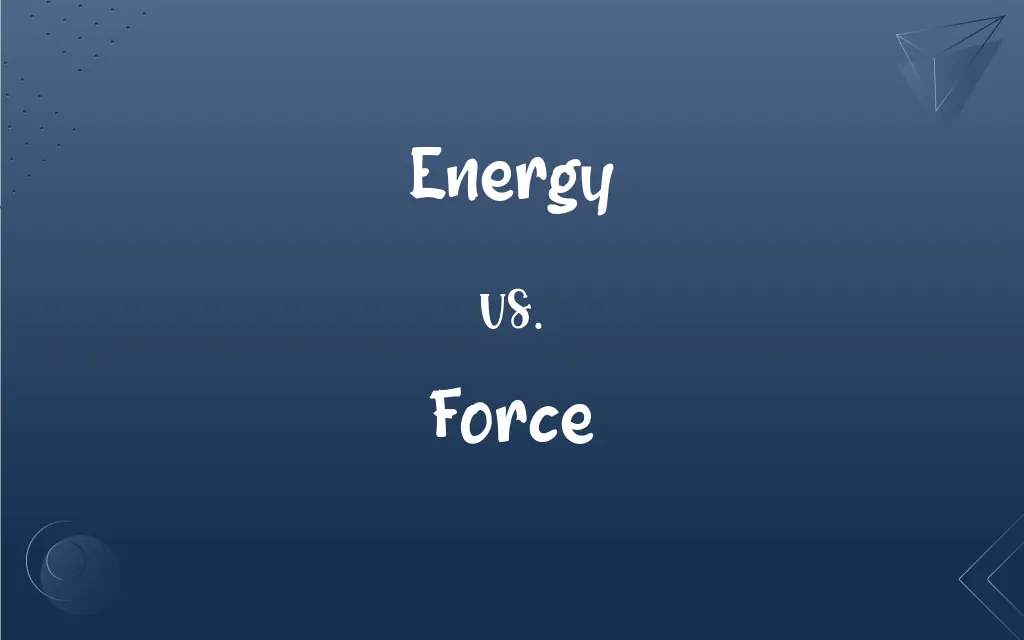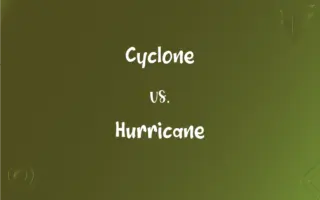Energy vs. Force: What's the Difference?
Edited by Aimie Carlson || By Janet White || Published on January 11, 2024
Energy is the capacity to do work or cause physical change; force is a push or pull acting upon an object.

Key Differences
Energy is a measure of the ability to do work, like moving an object or heating something up. Force, on the other hand, is an interaction that changes the motion of an object. Energy can be stored, but force must be applied.
In physics, energy takes various forms like kinetic or potential, each representing a different kind of work. Force, however, is always a direct interaction, like gravity or friction, affecting how an object moves or is held still.
Energy is quantified in units like joules or calories, showing how much work can be done. Force is measured in newtons, indicating how much push or pull an object experiences.
Energy can be transferred or transformed, like from chemical to mechanical. Force is not transferred; it is the direct cause of movement or deformation.
Energy and force are closely related in physics, with force often involved in the transfer or transformation of energy, yet they are distinct concepts.
ADVERTISEMENT
Comparison Chart
Definition
Capacity to do work
Interaction causing motion
Units
Joules, Calories
Newtons
Types
Kinetic, Potential
Gravitational, Frictional
Transferability
Can be transferred
Direct and non-transferable
Relation to Work
Directly related
Causes acceleration
ADVERTISEMENT
Energy and Force Definitions
Energy
Energy is the capacity for doing work.
The wind turbine converts kinetic energy into electricity.
Force
Force is the power exerted by physical action or natural phenomenon.
The force of the earthquake was devastating.
Energy
Energy refers to the strength and vitality required for physical activity.
After the marathon, her energy levels were low.
Force
Force is a push or pull upon an object.
The force of the wind knocked over the tree.
Energy
Energy is the power derived from physical or chemical resources.
Solar panels harness solar energy to produce power.
Force
Force can mean strength or energy as an attribute of action.
He applied force to open the stuck window.
Energy
In physics, energy is the property that must be transferred to perform work.
The ball gained kinetic energy as it rolled downhill.
Force
In physics, force is an influence causing a body to accelerate.
Gravity is a force that attracts objects towards each other.
Energy
Energy can be the intensity or vitality of an action.
His speech was full of energy and passion.
Force
Force is used to refer to coercion or compulsion.
The law was enforced by force.
Energy
The capacity for work or vigorous activity
Who has the energy to climb that trail?.
Force
The capacity to do work or cause physical change; energy, strength, or active power
The force of an explosion.
Energy
Also energies Exertion of vigor or power
A project requiring a great deal of time and energy.
Devoted her energies to writing songs.
Force
Power made operative against resistance; exertion
Use force in driving a nail.
FAQs
What is energy?
The capacity to do work or cause physical change.
How is force measured?
In newtons.
Can energy be created or destroyed?
No, according to the law of conservation of energy.
Can energy change forms?
Yes, like electrical to mechanical energy.
How is energy measured?
In joules or calories.
Is energy always in motion?
Not necessarily; potential energy is stored energy.
What role does force play in motion?
It causes or changes motion.
What are examples of force?
Gravity, friction, applied force.
Does force always cause movement?
It can cause or resist movement.
Is light a form of energy?
Yes, electromagnetic energy.
Is sound energy?
Yes, it's a form of mechanical energy.
What is force?
A push or pull acting upon an object.
What is gravitational force?
The attraction between masses.
Can forces be balanced?
Yes, resulting in no net motion.
What are common types of energy?
Kinetic, potential, thermal, chemical.
Can force exist without energy?
No, force often involves the use or transfer of energy.
Is thermal energy related to temperature?
Yes, it's related to the motion of particles.
How does energy transfer in a system?
Through work or heat transfer.
What is frictional force?
The force resisting motion between surfaces.
What is the relationship between force and acceleration?
Force causes acceleration.
About Author
Written by
Janet WhiteJanet White has been an esteemed writer and blogger for Difference Wiki. Holding a Master's degree in Science and Medical Journalism from the prestigious Boston University, she has consistently demonstrated her expertise and passion for her field. When she's not immersed in her work, Janet relishes her time exercising, delving into a good book, and cherishing moments with friends and family.
Edited by
Aimie CarlsonAimie Carlson, holding a master's degree in English literature, is a fervent English language enthusiast. She lends her writing talents to Difference Wiki, a prominent website that specializes in comparisons, offering readers insightful analyses that both captivate and inform.






































































